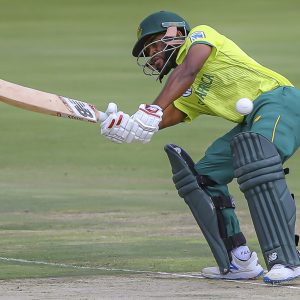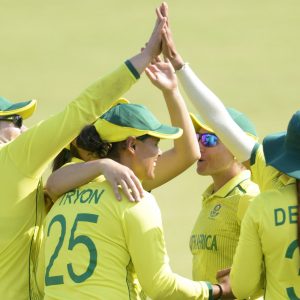SA’s cricket crisis is far from over
Cricket South Africa narrowly avoided forcing Nathi Mthethwa’s hand only to find itself under threat from Sascoc, throwing the game and all involved back into turmoil.
Author:
14 May 2021

Cricket fans in South Africa breathed a collective sigh of relief late on 25 April when – after much posturing, teapotting and obduracy – the members’ council and interim board of Cricket South Africa (CSA) agreed on how to govern the game moving forward.
They amended the memorandum of incorporation and the two bodies agreed that the way forward was a majority independent board, and an independent director.
The relief was palpable, because Minister of Sports, Arts and Culture Nathi Mthethwa had signalled that he would defund and no longer recognise CSA as the ruling body if its members’ council and interim board did not come to an agreement about the future governance of cricket in the country. National colours would be stripped and the livelihoods of thousands employed by the game would have been in jeopardy.
Related article:
All this in the midst of a domestic shake-up to a two-tier system with promotion and relegation, and a change from six franchises to 15 provincial sides. Add to this growing uncertainty around the immediate travel plans of the Proteas men’s and women’s teams and South African cricket is still hovering on the verge of a winter more ominous than the dark and lonely days of 2020.
So when the 25 April announcement arrived, a lot of cricket-minded folk slept easier that night. They slept easier still on 6 May, when the interim board and members’ council unveiled CSA’s new memorandum of incorporation and sang the same song of hope and unity.
But this is South Africa.
Sascoc brings more chaos
The South African Sports Confederation and Olympic Committee (Sascoc) has long advocated against an independent majority board and an independent director. As such, CSA’s about-turn became a major point on the agenda at its general council meeting over the Mother’s Day weekend.
Cricket is a recognised member of the International Olympic Committee (IOC), even though it is not played at the Olympic Games. And as the governing body for all codes that fall under the IOC, Sascoc resolved that sporting organisations under its banner must remain autonomous.
“We will engage with Cricket South Africa again,” Sascoc president Barry Hendricks told the TimesLive news website. “We think it is important to try to get them to adopt the policy that … there will not be a majority independent board and an independent chairperson.” Hendricks said Sascoc would request a meeting with CSA and hopefully come to an amicable agreement. The implications of that agreement not coming to pass are rather grim for cricket.
Should CSA not comply with certain clauses in the Sascoc constitution, it could be fined, suspended or have its membership terminated from the very authority that gives it international recognition. It is a web of procedure and posturing, much of which CSA has brought upon itself with its woeful governance in recent years.
The shambolic management of CSA and the public embarrassment this caused were what compelled Mthethwa to set up an interim board, prompting Sascoc to monitor its member at the same time CSA was creating its new domestic cricket system.
South African Cricketers’ Association (Saca) chief Andrew Breetzke said the past two years have been full of uncertainty and anxiety for many of its members with regards to job security, diminished wages, relocation and not knowing what your employer will do next. It was not for nothing that the association felt the need to publicise its concerns about the future of the game in South Africa.
Related article:
“The Momentum Proteas Women’s team has enjoyed unparalleled success over the past 14 months, and the women’s game in South Africa is on the verge of significant expansion. The development of the game is now under serious threat and at a time when we should be enthusiastic about the future, we have to be concerned about the future,” said Saca on 19 April.
The three senior national captains – Dané van Niekerk, Dean Elgar and Temba Bavuma – signed the letter, concerns about the future were that grave. CSA employees, the men and women who serve the game far from boardrooms and presidential suites, were also concerned enough to write an open letter to Mthethwa on 24 April. They highlighted the conditions under which they have continued to work for 18 tumultuous months and implored the minister not to go through with his plan to intervene.
“We respect and value your many contributions to CSA, cricket and to sport in our country. Please consider our request to reopen communication channels between your office and the decision makers at CSA to, importantly, resolve this unhealthy situation for all, and to allow the ordinary workers here an opportunity to continue to serve this organisation and our country proudly,” their letter said.
“Cricket saves lives,” it concluded, as the sport’s essential workers put their plight on public record. And they did so in their personal capacity, as they were not allowed to use CSA resources to get their message out to the public.

Red-flag destination
South Africa is scheduled to host the Women’s World Cup in 2023, but at this point the International Cricket Council (ICC) must surely have a contingency plan in place. A country that was once regarded as Plan B for tournaments at short notice because of its world-class facilities, organisational experience and logistical accessibility is now a red-flag destination.
The administrative failures in South Africa have also put cricket in Africa in jeopardy, as the administrative arm of the continental game resides in the offices of CSA. Whether those in power in South Africa care to acknowledge it or not, other African countries look to it as the spark from which to light their own cricketing fires. Most development tours look to South Africa for guidance, but more and more are looking at Namibia and Zimbabwe now.
The ICC still funnels support for continental growth through South Africa, so the happenings in the country are a source of discontent for the rest of the continent. South African cricket and its administration is supposed to be the benchmark, with its stable income and impeccable credentials. Instead, it is stumbling.
Related article:
The ICC has monitored the situation at arm’s length. It put out a tentative statement that essentially gives South African cricket time to get its affairs in order. “The ICC encourages members to work with governments to resolve issues,” said a spokesperson. “Not all government intervention is problematic and for the ICC to get involved, it requires a formal complaint from our members that it [government intervention] is unwanted.”
Sadly, it is now apparent that the sigh of relief on 25 April was premature. Cricket continues to lurch from crisis to controversy.
CSA hopes to hold its annual general meeting on 12 June. Sascoc is likely to flex its muscle. The livelihoods of CSA employees remain at stake. The senior men’s team hope to tour the West Indies in June. The women’s team hope to build on their incredible momentum. South African fans and stakeholders hope they will have a team to support at the men’s T20 World Cup in October.
But hope is a fickle currency, because it relies on people doing what they are supposed to do. A weary glance back at the past 18 months is evidence that people in charge tend to do what they want, when they want, regardless of the bigger picture.
In an ideal world, the future of South African cricket administration is sorted out in the next few weeks and some semblance of normality returns to the game. With nothing else in the bank, one can only hope.



